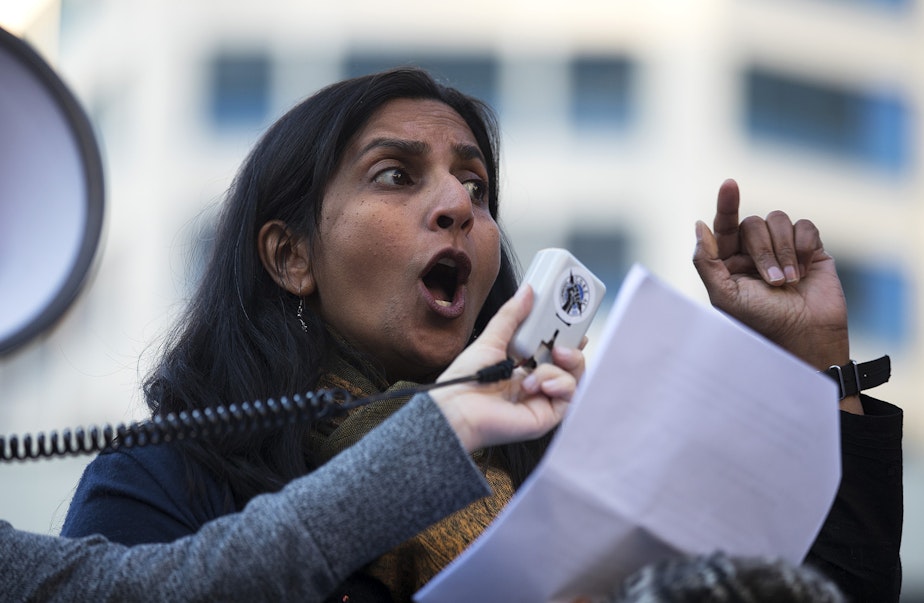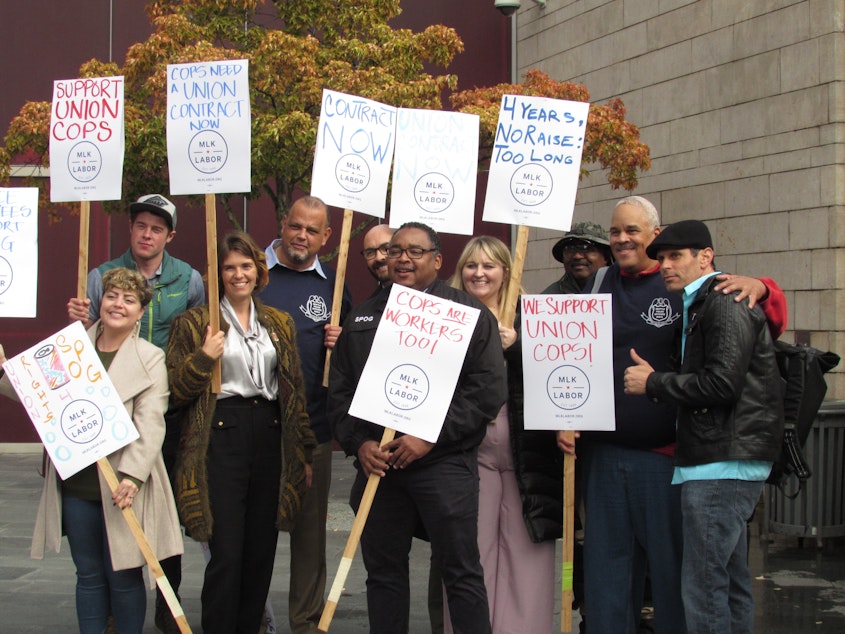Sawant’s labor critic says lost endorsement should be no surprise

This week the Martin Luther King County Labor Council endorsed Zachary DeWolf over incumbent Kshama Sawant for Seattle City Council in District 3. The reasons? The council’s president-elect Dustin Lambro says, “Let me paint a picture for you. Four years ago almost all of us universally in labor helped Kshama Sawant get reelected.”
This time “the vote wasn’t really even close,” Lambro said, with DeWolf receiving 74% of the council’s vote for the seat representing the Capitol Hill neighborhood. DeWolf is currently an elected board member for the Seattle Public Schools and served previously as a commissioner for the Seattle Housing Authority.
In response to the council’s vote, Sawant noted her recent efforts on behalf of hotel workers, museum workers, Amazon security officers, and Teamster Uber and Lyft drivers. “We're proud to be endorsed by 12 unions and counting, representing nearly 60,000 workers,” Sawant said in a statement. “It's unfortunate that, intentionally or not, a section of labor leaders have made a decision that will effectively further embolden Amazon and the Chamber of Commerce, rather than stand with the interests of working people.”
Sawant told KUOW she's not surprised to see differences in the local labor movement since it's happening nationally as well, over issues like climate change and police accountability. She said the message is not that the labor movement is divided: "What's happened around election races is really reflecting underlying questions facing our society, which is why they're also facing the labor movement."
Why did the labor council pull its support from Sawant? Lambro pointed to five major differences they’ve had since supporting her in 2015.
ONE: REFUSAL TO ENDORSE TERESA MOSQUEDA
In 2017, labor unions rallied behind Teresa Mosqueda as she sought an at-large seat on the Seattle City Council. “She was a bright light for the labor movement,” Lambro said. “We worked really hard. Part of that process was to ask city council members to endorse Teresa.”
Sawant declined, choosing instead to endorse Jon Grant, who ran as a socialist, although not part of Sawant’s Socialist Alternative party. She told media at the time she didn’t want “a copyright on the idea of independent politics” and believed he would draw in younger voters.
Sponsored
Sawant told KUOW both Mosqueda and Grant were progressive candidates and her choice should have been allowable. “A strong movement of any kind including a labor movement should be capable of having disagreements because disagreements are inevitable -- while having a united position, a united front, against big business and a system that exploits all of us," she said. Sawant said she was equally disappointed by the Labor Council's endorsement for Jenny Durkan in the race for mayor.
“I think many people felt like the relationship was a little bit frayed after that election,” Lambro said.
TWO: POLARIZING HEAD TAX DEBATE
“My union supported the employee hours tax, just because we have such an upside-down tax system here, but Kshama made it such a polarizing issue and that left, I think, a bad taste in many people’s mouths,” Lambro said. He said Sawant’s rhetoric to ‘Tax Amazon’ only brought stronger opposition from Amazon and the Seattle Metropolitan Chamber of Commerce. “We didn’t find it helpful, no one asked her to do that in the labor community, no one said, ‘hey please go and make this all about Amazon,” Lambro said.
THREE: WEIGHING IN ON TEAMSTERS CONTRACT
Lambro, who also works as political director for Teamsters Local 117, said his union was upset by Sawant’s perceived meddling in a national contract negotiated by the Teamsters for UPS employees. “The bargaining team said we want this to be ratified,” Lambro said. He said Sawant “took it upon herself to encourage people to vote against that. That for us was a red line. We do not need elected officials getting in our business when we’re negotiating contracts.”
Sponsored
Sawant wrote an open letter to UPS Teamsters in which she protested the wages and working conditions in the new contract. “UPS workers know they are getting a bad deal,” she wrote. “If UPS workers choose to fight, let the legacy of their victorious 1997 strike be a powerful reminder that workers everywhere can come together in solidarity.”
FOUR: REJECTING DEMOCRACY VOUCHERS
“We’re incredibly disappointed in her decision to not use the public financing system that many of us in labor fought for not even two years ago,” Lambro said. “We created the democracy voucher program to make sure we were able to lift up voices that didn’t feel like they had the resources to be able to participate in elections in the same way as big companies. Most candidates decided to respect the voters and use that public financing system. To my surprise, and I think to many others, Kshama did not. I just think that was a terrible decision.” Sawant told KUOW she supports the concept of the vouchers, but can’t afford to accept the spending limits involved. “If we don’t recognize the onslaught that there will be from big business against our campaign, then it is like forcing ourselves to fight the campaign with one hand tied behind our back,” she said.
FIVE: VOTING AGAINST THE SEATTLE POLICE CONTRACT
Sawant cast the lone vote against the city’s proposed contract with the Seattle Police Officers Guild last November, saying it would roll back important provisions in the city’s new police accountability law. In a statement at the time, Sawant said her vote was not anti-labor. “The labor movement has a proud history of standing with working people facing racism and oppression. In its best traditions, it has fought against how the ruling class uses the police to oppress and divide sections of the working class,” she said.
Sawant told KUOW, "There are debates emerging within the labor movement on various questions," and police accountability is one of them. "There was disagreement on the police officers’ contract in which I was the sole ‘no’ vote on the city council and I chose to stand with the black and brown community," she said. She said she felt vindicated when U.S. District Judge James Robart ruled that the contract puts Seattle out of compliance with the federal consent decree.
Lambro said the SPOG contract is “obviously a controversial issue.” But he said the police officers “are working people and they deserve to be treated with dignity and respect on the job and that’s what a contract is.”
Sponsored

6/21/19: This article has been updated to include a response from Councilmember Sawant.




